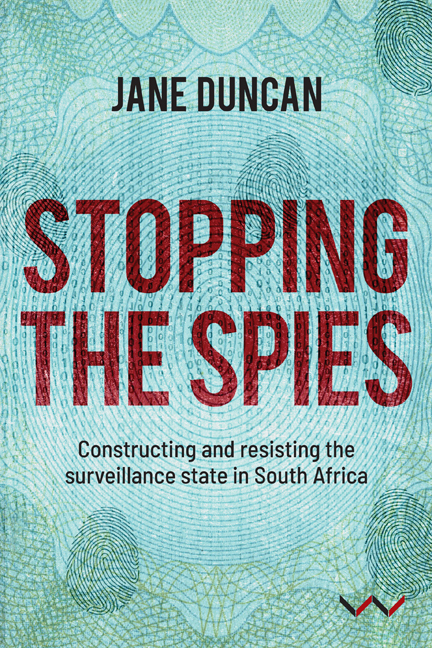Book contents
- Frontmatter
- Contents
- Acknowledgements
- List of Figures and Tables
- List of Acronyms
- Preface
- Introduction
- Chapter 1 Theorising the surveillance state
- Chapter 2 Is privacy dead? Resistance to surveillance after the Snowden disclosures
- Chapter 3 The context of surveillance and social control in South Africa
- Chapter 4 Lawful interception in South Africa
- Chapter 5 State mass surveillance, tactical surveillance and hacking in South Africa
- Chapter 6 Privacy, surveillance and public spaces in South Africa
- Chapter 7 Privacy, surveillance and population management: the turn to biometrics
- Chapter 8 Stopping the spies: resisting unaccountable surveillance in South Africa
- Chapter 9 Conclusion
- Notes
- Select Bibliography
- Index
Chapter 8 - Stopping the spies: resisting unaccountable surveillance in South Africa
Published online by Cambridge University Press: 17 May 2019
- Frontmatter
- Contents
- Acknowledgements
- List of Figures and Tables
- List of Acronyms
- Preface
- Introduction
- Chapter 1 Theorising the surveillance state
- Chapter 2 Is privacy dead? Resistance to surveillance after the Snowden disclosures
- Chapter 3 The context of surveillance and social control in South Africa
- Chapter 4 Lawful interception in South Africa
- Chapter 5 State mass surveillance, tactical surveillance and hacking in South Africa
- Chapter 6 Privacy, surveillance and public spaces in South Africa
- Chapter 7 Privacy, surveillance and population management: the turn to biometrics
- Chapter 8 Stopping the spies: resisting unaccountable surveillance in South Africa
- Chapter 9 Conclusion
- Notes
- Select Bibliography
- Index
Summary
State spying has always been a secretive business. However, digitisation has changed many areas of life, including the work of the intelligence agencies, a lot of which are shifting from relying on human intelligence to signals intelligence. As the latter is even less visible than the former, using it potentially carries fewer political risks, as spying is less likely to be uncovered. In the analogue era, activist movements could always uncover spies in their midst (and often did). Some even learnt to recognise when their phones were being tapped. When it is ‘well’ conducted, modern communications surveillance is much more difficult to detect than the phone-tapping of old. This means that activists face enormous difficulties in mobilising around this less visible but more ubiquitous and insidious form of surveillance.
This chapter assesses the impact of state communications surveillance, or the threat of it, on professions and constituencies that are particularly vulnerable to surveillance in South Africa, as the privacy of communications is central to their work, rather than incidental to it. It focuses on the phenomenon of political surveillance, that is, surveillance of professionals and activists who work in politically sensitive areas, in particular academics, journalists, political activists and lawyers. Through semi-structured interviews, it analyses personal accounts of all these actors to understand their experiences of surveillance generally and communications surveillance specifically, and how they are resisting surveillance or the threat of surveillance. The interviewees – four academics, three lawyers, three journalists and thirteen activists – are not named to protect their confidentiality.
Drawing on the experiential knowledge of these actors, I outline a framework for effective resistance to surveillance. Contrary to the views of those who have (wrongly) characterised it as an elitist issue that is of little relevance to workers, the unemployed and the global South more generally, I explore how activists and information professionals are crafting resistance strategies that could, potentially, address the bigger political and economic context in which surveillance practices are expanding. Such a context, arguably, requires an organised political response that links resistance to surveillance to resistance to the broader political economy. In this respect, South Africa could be considered something of a ‘laboratory’ for resistance strategies.
- Type
- Chapter
- Information
- Stopping the SpiesConstructing and resisting the surveillance state in South Africa, pp. 185 - 204Publisher: Wits University PressPrint publication year: 2018



